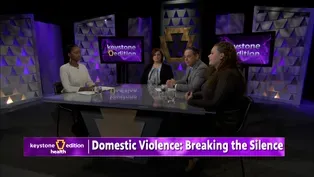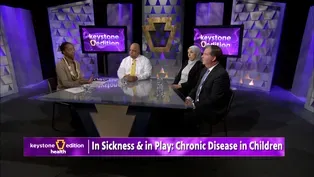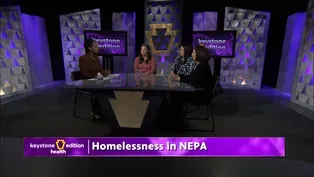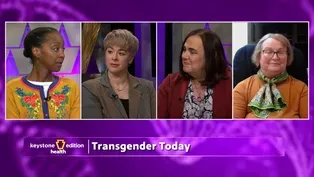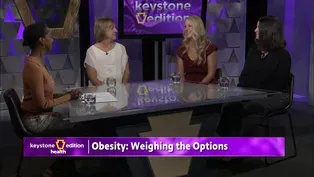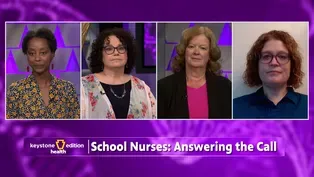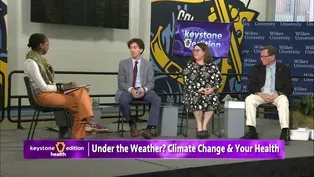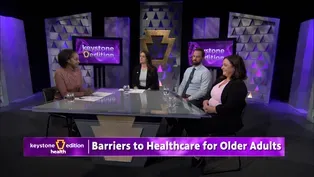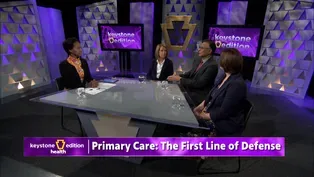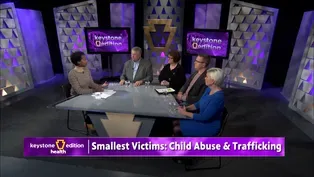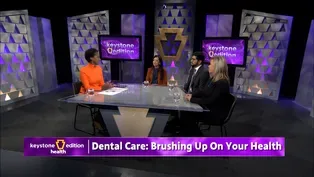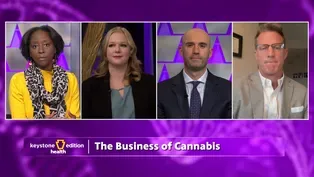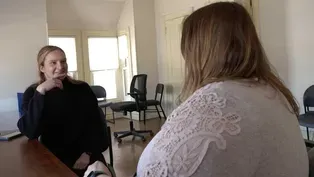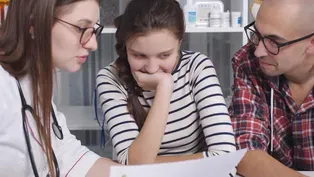Keystone Edition
Teens & Mental Health
4/25/2022 | 26m 59sVideo has Closed Captions
Learn what parents and schools can do to help teens navigate their most formative years
Mental health conditions among children, teens, and young adults - specifically, depression, anxiety, substance abuse disorders, and an alarming trend toward suicide - is a growing problem in our region. Keystone Edition Health will examine what parents and schools can do to help teens navigate through their most formative years.
Problems with Closed Captions? Closed Captioning Feedback
Problems with Closed Captions? Closed Captioning Feedback
Keystone Edition is a local public television program presented by WVIA
Keystone Edition
Teens & Mental Health
4/25/2022 | 26m 59sVideo has Closed Captions
Mental health conditions among children, teens, and young adults - specifically, depression, anxiety, substance abuse disorders, and an alarming trend toward suicide - is a growing problem in our region. Keystone Edition Health will examine what parents and schools can do to help teens navigate through their most formative years.
Problems with Closed Captions? Closed Captioning Feedback
How to Watch Keystone Edition
Keystone Edition is available to stream on pbs.org and the free PBS App, available on iPhone, Apple TV, Android TV, Android smartphones, Amazon Fire TV, Amazon Fire Tablet, Roku, Samsung Smart TV, and Vizio.
Providing Support for PBS.org
Learn Moreabout PBS online sponsorshipMore from This Collection
Domestic Violence: Breaking the Silence
Video has Closed Captions
Access to the right resources can make facing this challenge a little easier for families (26m 59s)
In Sickness and in Play: Chronic Disease in Children
Video has Closed Captions
About 25% of children in the US aged 2 to 8 years have a chronic health condition (27m)
Video has Closed Captions
Homelessness can happen to anyone at any age or socio-economic status. (26m 59s)
Video has Closed Captions
As we raise the visibility on Transgender young adults and embrace them within our culture (26m 59s)
Video has Closed Captions
Obesity is a serious risk factor many try to avoid when developing healthy eating habits. (27m)
School Nurses: Answering the Call
Video has Closed Captions
What can our school districts do to help retain and recruit nurses for future generations? (27m)
Under the Weather? Climate Change & Your Health
Video has Closed Captions
How does climate change impact individual and public health? (54m 59s)
Barriers to Healthcare of Older Adults
Video has Closed Captions
What progress have local organizations made in addressing these challenges? (27m)
Primary Care: The First Line of Defense
Video has Closed Captions
When was the last time you saw your primary care doctor? (27m)
The Smallest Victims: Child Abuse & Trafficking
Video has Closed Captions
What are the signs to know to spot child abuse and even possible trafficking? (27m)
Dental Care: Brushing Up on Your Health
Video has Closed Captions
How can providers make dental care more affordable and accessible? (26m 59s)
Video has Closed Captions
What does the cannabis industry mean for Northeastern and Central Pennsylvania? (26m 59s)
Providing Support for PBS.org
Learn Moreabout PBS online sponsorship- Live from your Public Media Studios, WVIA presents Keystone Edition Health, a Public Affairs program that goes beyond the headlines to address issues in northeastern and central Pennsylvania.
This is Keystone Edition Health.
And now moderator, Tonyehn Verkitus.
- Good evening and welcome to Keystone Edition Health.
I'm Tonyehn Verkitus.
Thank you for joining us.
Tonight, we'll look at increasing rates of mental illness in teens and young adults.
And what we can do to support the mental health of young people.
First, WVIA's, Paul Azar has more.
- [Paul] The teenage years can be some of the most formative and most difficult of our lives.
Teens today already have their plates filled with school and social stress, but many have additional struggles with mental health.
Recent studies indicate that approximately one in five teens between ages 12 and 18 suffer from at least one diagnosable mental health disorder, and local agencies helping teens and adolescents report rates of depression, anxiety, substance use disorders, and suicidal thoughts are on the rise.
Experts say families can help their teens by having frequent open conversations about emotions and helping to catch any issues early on.
For Keystone Edition Health, I'm Paul Azar.
- Joining us tonight, we have Janine Fortney, Director at the Children's Advocacy Center.
Summer Krochta, Vice President of Programs at the Children's Service Center and Ed Cosgrove, Outpatient Therapist at the Scranton Counseling Center.
Thank you all for joining us to night.
So, I'm excited to have our conversation.
You are all coming at this from different directions sort of, Summer, I'll start with you.
At your center, you're working with different types of programs.
Can you tell us a little bit about the three primary programs that you have for teens and young adults?
- Yeah, so at Children Service Center we have a whole array of services.
So we, we have outpatient therapy, we have residential programs, we have partial hospitalization for education.
But we also have a crisis department that serves all of those who are in Wyoming County, for any kids that are in crisis situation.
- [Tonyehn] And Ed, you're kind of working inside the school and outside of the school.
What any range of kids are you working with and what majority of your time are you spending in the school?
- The age range is about six to 18.
Sometimes five, it depends on who's calling.
And then I spend about, a day, day and a half in the schools.
We, we do a number of schools around here, North Pocono, Valley View, Mountain View, and then rest of the time is in the office with appointments.
- And how is it that you're working in the school and in the office because obviously there's guidance counselors - [Ed] Yeah.
- in the school.
- So, how is your role different from theirs?
- Well, we, we get the kids that have sort of graduated in problems and then we help out the guidance.
We work very closely with the SAP, the Student Assistance Program, and then we'll take referrals from all the guidance counselors.
We work very closely with them.
When we go to the schools we have a dedicated space that we're in, that's HIPAA compliant and quiet, and the kids that can come in and have full anonymity.
And then, then we go back to the guidance counselors and the SAP team and say, this is what the treatment plan that we think we should do for the kid.
- And Janine your role is a little bit different from the two of them as a forensic interviewer.
How does your job different or differ in terms of your interactions with the kids?
- Well, a lot of what Ed and Summer provide are long term types of programming.
The forensic interview is really for the most part, a one time situation because of allegations of abuse of any kind or maltreatment.
So, I might see the child one time for that forensic interview and then make referrals for the types of services that they provide at their agencies.
- And how did these children get to you?
- Well, when a mandated reporter makes a child abuse call, it goes through Children and Youth Services and/or a law enforcement jurisdiction, and then they make those referrals to us as part of their investigative process.
- Ed, what types of issues do you think children are facing right now?
What are you seeing a lot of.
- The younger ones, a lack of structure, and then acting out.
A lot of attention-seeking behavior if they don't get the structure that they need at home, or it usually manifests itself in the school then with peers or something, you know, pushing and shoving and then it can gradually get worse if it's not caught.
And then we think of it like, the wheel is spinning and but the spokes, we're the stick.
So, we just stick ourselves in there and just try to stop it and then work from there.
The older kids, again, structure is a big thing.
The pandemic had a big influence on a lot of us.
We were doing telehealth and Summer and I were talking before, I mean, doing telehealth with a six year old is fun.
So, but it's different.
So, we had to do a lot of adapting, which the kids had to do.
And some adapted better than others.
So, we're trying to help the ones that haven't adapted so well, so.
- Starting mental health care as a teen can be critical for managing issues as we grow up.
We met Savannah Halchak, who has been working on her mental health at the Children's Service Center for several years.
- When I first started here at Children's Service Center, I started in Miss Melissa's Youth Skills program.
I was 17 at the time.
It took a while for me to actually trust Miss Melissa.
I had a lot of trust issues growing up after my mother left and then, basically abandoning me and my sister.
I started trusting her more when the pandemic hit and I had someone to talk to about that.
And someone to relate to that knew more what was happening and could help me through those little things that I knew that I couldn't get myself through.
People my age that should know about mental health is that it could be very, scary, because there are so many people these days that don't know how to cope with it, and that could possibly take their own lives because of it.
If you actually open up to somebody that you trust, or you even a close friend, relative or somebody, just like say what's on your mind could possibly help you with things in the long run.
I progressed in my journey with graduating high school in, last year of 2021.
I just recently got my license before Christmas of last year.
About a month ago, I got my a first car.
And the fall of this year, I'm going back to LCC to do Hospitality Management.
With my future, I'm very positive with how things are gonna go.
I feel that I know that my future is very bright and anything I could accomplish, I will.
- So Summer, can you tell us a little bit more about the difference between the residential program and the partial hospitalization and also why someone would be in one as opposed to the other?
- Okay.
So we have our, our partial hospitalization, which is Kindergarten through 12th grade.
It is a program where children can go to receive their educational services as well as a therapeutic component.
So, they have all of their individual therapy, family therapy, medication management, all, you know, within the school day.
It's a smaller therapeutic setting, so, they can focus on their mental health as well as their academics.
We do have a residential treatment facility.
That is one of the most restrictive levels of care.
And an individual would go there if they're needing more out of home therapeutic services.
So, they again, receive all of their services in house.
They have a therapist.
A doctor sees them for medication management.
They really focus on their social skills, and then the idea is they go out to a public school setting to really be able to cross the skills they're learning in the therapeutic setting into a public school setting.
And then we do also have our day program, our psych rehab, which is either after school, where Savannah started, and then she's graduated into the adult program.
So, it's just another area where you can go to, to really focus on additional life skills.
- So, with a lot of the children that you're interviewing, what sorts of trauma are they dealing with?
And would you say that in our area, you see more types of trauma than we may in other areas?
- I think with the Children's Advocacy Center focus is primary to child sexual abuse.
So, a good majority of the kids that we see do come in with those types of allegations.
There's also a lot of physical abuse cases.
And we've even had on occasion, children who've witnessed significant violence or, or homicide.
I think what, what, you know, some of the things that stand out to me and Savannah really made a key point as far as that trust because the kids that we see, you know, they're in situations where it might not be going very well.
They may be getting abused in one way or another.
So, to find somebody that they can trust enough to share what's happening is so vital because that's the key that opens that door for their healing.
- Now, you mentioned that you have crisis services and you you're definitely considered crisis.
Do you think that the need increased during the pandemic?
Were you getting more calls?
Were you seeing more children come in?
- That's a great question.
It actually, the pandemic kind of shut down a lot of, or put up barriers I should say to mandated reporting because all of those individuals, teachers, coaches, you know, areas where kids would be out and involved in community activities, that was shut down with the pandemic.
So, those eyes and ears that would normally be making the phone calls were, were not able to, they weren't really seeing those kids.
So, as we're coming out of that and getting back in into those more public settings, I definitely feel like we're we're hearing and seeing more.
- [Summer] Yeah, I would agree with that.
I feel like during the pandemic, we didn't see as many kids, but by the time they would make it to crisis, their needs were pretty serious.
So, we were seeing a lot more of pretty in intensive suicidal thoughts or gestures.
And seeing an increase in hospitalizations.
- Yeah.
- And I read that suicide is the fourth leading cause of death amongst teens.
Do you hear lots of ideation Ed or do you get, do you hear it too late, maybe.
- Thankfully we hear it before something tragic happens.
Pretty good track record there.
I mean, with the pandemic, we lost touch too, with a lot of people with emergencies, but the adult population went up as far as calling for crisis and, just I'm alone, I can't take this anymore, that kind of normal stuff that you would expect from isolation.
With the kids, it would, suicidal ideation, it, it comes up, but it, it's a fine line.
You have to be real careful about what level they're at and you have to be a pretty good questioner to find out if they're actually sincere or if there's like a girlfriend or a boyfriend involved or it's something that we may consider minor but is major to them.
So, finding them where they're at and then meeting them there and then going from there, so.
- You mentioned also telehealth.
Do you think that was a good way to see into people's homes, maybe get a better feel for what these children were living with day to day.
And I don't know if you all were also doing telehealth, - Yeah.
- but I'd be curious to know.
- Yeah.
Yeah, absolutely.
You, try your best in the beginning to do it, but then life takes over and then they forget that they're on telehealth.
They're at the kitchen table and then, you know, you see the, the two brothers fighting in the background and you say, ooh, two more patients.
And then, you know, it, it just gets, their guard goes down after a while with telehealth.
We encourage 'em to get into a room by themselves but not everybody has the means.
Like they might have one pad that they were using for school telehealth, texting their friends, all that stuff.
So yeah, it was an, an interesting glimpse into the homes and you suspect that it's chaotic and then you actually saw that it was chaotic and then you could sort of make adjustments to that, so.
- And if you're losing touch with children during the pandemic, for instance, how do you reacclimate them when they return to programs?
- Well, I think it's just really focusing on structure and routine and expectations and just really giving them the avenue of, of expressing their feelings, you know, and letting them talk about it that acknowledging that this was hard, that we're going through a lot and allowing them a space to be able to process that and talk about that and, and be there to kind of be a sounding board for them.
But really it's just putting that structure back into place is really key for adolescence.
- [Janine] And the expectations.
- Yes, definitely.
- I like that you included that.
- Yes, yes.
- That's a big deal.
- And, and are any of you dealing with the parents as well?
What sort of advice are we giving them or are some of them actually in treatment just out of curiosity.
- Well, I know the parents that we're working with, I mean, we really validate what they're going through in their feelings and, you know, teenagers are at the age of independence.
That's what they're doing, right?
They're really trying to practice their own independence.
But as caregivers, we need to be providing some guidance and some support and teenagers are really going to learn from us by us modeling behaviors to them more than they're gonna hear us talking.
So, it's really important that we are modeling, taking care of ourselves too.
You know, and the pandemic was just as hard on the parents as it is for the kids.
And so we really encourage them to go and get support and reach out and, you know, get a therapist for themselves too.
'Cause then you're kind of normalizing that for their adolescent as well.
- Janine, you mentioned Childline.
How are people connecting with Childline and is that something that I could do myself, if I suspected there was an issue.
- [Janine] Yes.
Yes, absolutely.
So, in Pennsylvania, there's mandated reporters such as us, teachers, coaches, but there's also a voluntary, like you would be, if you saw something out in the world, yeah, you absolutely can call Childline.
You can either look it up.
There's a, keepkidssafe.org is a great resource and, and a way to get connected to Childline and you can also call the phone number and I'm gonna see if I can do this right.
Help me.
1-800.
Nope, I've lost it.
- Well, you could just call 2-1-1.
- Or you could just call 2-1-1.
- Yes.
- Yes.
That is an even easier way to do that.
- Right.
- Absolutely.
- I wondered if 2-1-1 would take you over to Childline.
- Yeah, 2-1-1 could get you connected to pretty much anything you need.
- Okay.
- But, definitely Childline too.
- We talked a little bit about structural family therapy.
Can you describe what that is to our viewers?
- Well, we just start talking about the family.
Basically, it's the kid that's acting out is probably a symptom of what's going on in the family.
So, it's never, well, it's hardly ever never, in isolation that it's that bad kid and everybody else is well adjusted and doing great.
So, the key is to treat the kid and then also treat the family by finding out, we call it a secret, but it's not really a secret it's what's going on in the family that they're trying to protect.
And usually the kid that's acting out is protecting that secret or what's going on.
And then if you can break through that and then, then that's why they call 'em breakthroughs.
It's like, you get there, and then you're able to figure out what, what's going on with the actual patient and then extrapolate over to the family and take care of them one by one, if you have to, so.
- So, I would guess Summer, the kids that are coming to the residential program, they're probably dealing with some of these secrets, which is why they're not staying at home, possibly?
- Yeah.
I mean, kids come to us from a variety of different reasons, but yeah, there's, there is a significant issue in whatever their home life looks like.
And so they come to us and we do a lot of family reunification and work.
So, families are very involved in the treatment with the kids in the RTF.
- And for you, once children have met you and you decide what sort of care they need, where are they going for that care?
- Well, since we do cover the, our CAC covers two counties and then my umbrella organization, Family Service Association covers Luzerne county.
So, with, with our two counties, we make referrals to resources that are within their neighborhood or their community that might be with the, the therapists that we have on staff or through integrative counseling.
There's a variety of other options.
Dr. Kuna and Associates has a, a place in Tunkhannock.
So, and Children's Service Center is located in Tunkhannock as well.
So, there are a lot of good resources that we can connect families with depending on their needs.
And, and as everyone had said, you know, even for the parents, we will help to make sure that they can get connected.
And then Family Service Association has an abundance of services as well.
So, we try to utilize that when we can.
- So, let's pull it back a little.
We're talking about kids who may have experienced some trauma, but then we just have your average teenagers like mine.
What would be some warning signs that I, as a parent, should be looking for?
- I usually like to tell families that one of the first things really is you, you know your child, you live with them, you see them every single day.
So, if you see that they're, typical behaviors are, you know, friendly, outspoken doing well in school, you know, certain, it was certain ways that they're behaving and then you start to see those behaviors change into something totally different.
Those can be warning signs that something's up.
And you know, I also think that it's really important.
If a parent does see that there's something changing a million questions is not going to get you an answer.
A trusting statement, you know, I'm here for you, let me know when you need something.
You know, not, not daily, not constant because teenagers are teenagers.
They hole up in their room, as it is.
- [Tonyehn] Right.
- You start bombarding them with a million questions and you're not gonna see them again.
So, just be aware of the child you know, and if that starts to change, just little bits here and there and remind them that you're there for them when they need you.
- Ed, let's say we've had that preliminary conversation and we realize we need to take it a step further.
How do we have that more difficult conversation with our kids?
- Well, the conversation starter is important.
But the stopper is just as important.
If, as soon as they hear when I was your age, you're done.
They just, they just cloud over and they, I don't care when dinosaurs roamed the earth, it's like, it just doesn't matter.
But the starter for something's wrong, we know something's wrong.
You may not know what's wrong, but we're here, if you want to talk.
But we can get you help if you need it.
So, let me know later.
And then you sort of sneak your way in, rather than bombard your way in about, you know, remember what we talked about before.
What do you think I make that call.
I know somebody that works in there.
Why don't you call him and just talk to him.
You don't have to go to therapy.
You don't to do, and then you sort of ease them in.
And usually when they get in it's, they love it.
Finally, somebody's, - Listening.
- not telling me to stop it, you know, so.
- And Summer, we already mentioned that teenagers hide themselves in their room.
I do recall waking up one day and thinking what happened to everyone.
They're all locked in their rooms doing who knows what.
- Yeah.
But we've talked about warning signs.
At what point is it too much in the room.
I know I knock on the door, - Right.
- And I'll go in and say, Hey, can I hang out with you - Yeah.
- for a second?
- But when do you know, all right, now it's an issue.
- I think it's really important to create space within your routine to have those engaging conversations.
So, not bombarding them, but say, hey, we're gonna make dinner tonight.
I want you to come out and help me make dinner.
Have family dinners every night.
You know, have situations that are normalized situations where you can have those conversations.
And it's okay to say, are you struggling right now?
It, you know, a lot of people struggling right now.
Do you ever have thoughts of suicide?
You know, I think most people are uncomfortable saying those words.
And it's very important to say those words.
And by saying that, you know, are you having thoughts?
Have you ever had thoughts.
Then you're opening up the door of, oh, we can talk about that.
Because teenagers also talk to teenagers.
And so our kids are really the support person for their peer group.
So, by having that conversation, you're helping them realize, oh, my mom and dad are a safe place to have that conversation.
Guess what, I'm not feeling that way, but my best friend might be feeling that way.
And so you're really opening up the doors of, of having that conversation.
- [Janine] I think a huge misconception is that if you use the word suicide or self harm or anything related to that, that you're going to put that thought into a child.
You're not putting it there.
- Right.
- You're giving them an open door to have that conversation with you.
And I think that people really need to understand that that's what it is, it's not placing those thoughts into, into anyone's head.
- Now as adults, of course, we struggle as well.
So, I would imagine sharing our vulnerability kind of lays a good groundwork for that conversation, but how do we do that without going overboard?
Would you like to touch on that?
- Well, yeah, I, there's no parent handbook.
- No.
- But if, if every parent could take a developmental psych course and find out where kids are supposed to be at that age, that they do isolate, they do get into their phones.
And they're always, we spend a lot of time telling parents, like, they're not gonna break, they're, they're okay.
They're, they're having trouble, but they're not gonna break because sometimes they go right to the Hallmark movie channel ending like, you know, good morning, what do you wanna know, and they're on drugs.
- Yeah.
- And then it's like, so you don't want to jump that quickly.
But, you know your kid the best.
So, you know, they're gonna mirror your mood and they're gonna match your mood.
So, if they're up here and you're matching their mood then nothing gets done.
So, you gotta bring 'em down to their mood and let 'em match you.
And that just comes from conversation.
Usually teasing, kidding, sense of humor stuff when, you know, that's a lot less like, sit down and talk to me about your problems.
- [Tonyehn] And would you say that kids are probably more resilient than we think, so.
- Absolutely.
- Not to say they'll just bounce back, but.
- Oh no, they can handle a lot more than we get some credit for.
- [Ed] Oh, yeah.
- Definitely.
- Well, I'll have to be more aware of that.
- [Ed] Yeah.
- Because I feel like sometimes we tiptoe around our kids a little.
- [Summer] Yes.
- So, if you were gonna leave us with a little bit of advice for maybe how to start these conversations with kids, or even just lay the groundwork.
You may think there's nothing happening now, but if you just want to lay the groundwork for the day you feel there's an issue, what should we do?
- I think for one suggestion, like again, kind of keeping in mind that adolescents are really wanting that independence.
This is developmentally the time for them to practice that, but they need the guidance.
They need the support.
So planning, having conversations, intentional conversations about helping them problem solve through stressful situations.
You know, it could be something as simple as really struggling with a test and help them kind of problem solve through what, what could have helped them do better, But let them come up with the solution.
So, we should not be telling them or, or providing the suggestions, just being that sounding board and just, that's how I think you really show that you're there to really support them.
- Yeah, not sharing what you did as you said, because I know I've done that before and then the girls go, I'm not you.
And I'm like, you're right.
- [Summer] Right.
- You're not me.
Would you like to add anything to that, Ed?
- Yeah.
I mean, that's right on, it's, my two favorite words in therapy are stop it.
It's that, sometimes that's what you have to say.
And parents are afraid to say that because they might be hurting the kid's feelings.
- Right.
- Or they're gonna rebel.
They're gonna come back, I'd stop reading Google if you're a parent and I'd like, go with what the kid is giving you, like what's in front of you.
Not what you heard from other expert parents and from other amateur psychologists.
There's lot of them.
- [Tonyehn] Thank you so much.
I would like to thank all of our guests for joining us tonight.
I'm Tonyehn Verkitus, have a good evening.
(light airy music)
Video has Closed Captions
Savannah Halchak shares her personal struggle with mental health and how she got help (1m 50s)
Providing Support for PBS.org
Learn Moreabout PBS online sponsorshipSupport for PBS provided by:
Keystone Edition is a local public television program presented by WVIA
